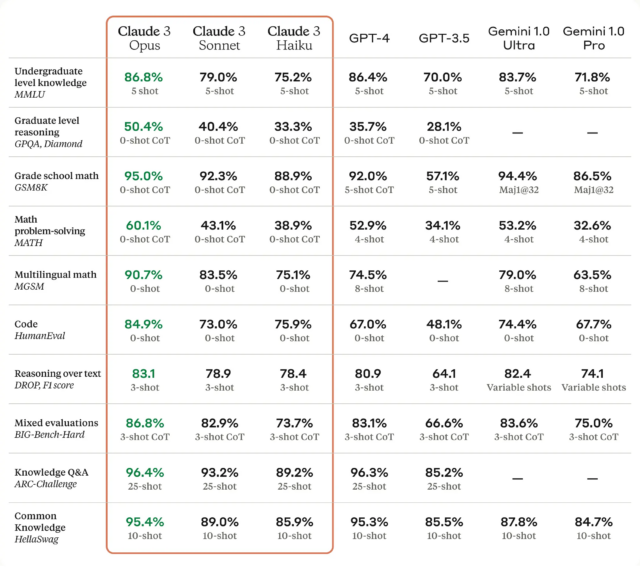Anthropic a dévoilé Claude 3, une gamme de trois modèles de langage IA similaires à ceux qui alimentent ChatGPT. Anthropic affirme que ces
OpenAI’s rival, Anthropic, has unveiled its multimodal models Claude 3, which are more powerful, more accurate, and offer competitive pricing.
Anthropic has unveiled Claude 3, a range of three AI language models similar to those powering ChatGPT. Anthropic claims that these models set new benchmarks in the industry for a range of cognitive tasks, even reaching “quasi-human” capabilities in some cases. They are now available on Anthropic’s website, with the most powerful model only available through subscription. They are also available via API for developers.
Anthropic’s Claude 3 model suite, consisting of three versions with evolving skills and configurations: Haiku, Sonnet, and Opus de Claude 3. The intermediate model, Sonnet, currently powers Claude.ai’s chatbot, accessible after a simple email sign-up. However, Opus, the most advanced model, is only accessible through Anthropic’s chat interface and requires a $20 monthly subscription to access the “Claude Pro” service, available on the Anthropic website. These models share a context window capable of handling up to 200,000 tokens, allowing for detailed linguistic analysis.
Claude 3 distinguishes itself with superior abilities in a variety of cognitive functions, including reasoning, expertise in specific knowledge domains, mathematical skills, and linguistic fluency. Although the “knowledge” or “reasoning” capacity of large-scale language models is debated, these terms are used within the AI scientific community. According to Anthropic, Opus, the most advanced model, achieves comprehension and proficiency thresholds in performing complex tasks that rival human capabilities.

Claude 3 benchmark
According to Anthropic, Claude 3 Opus outperforms GPT-4 on 10 AI benchmarks, including MMLU (undergraduate-level knowledge), GSM8K (elementary school mathematics), HumanEval (programming), and the very colorfully named HellaSwag (common knowledge). Several of these victories are very close, such as 86.8% for Opus versus 86.4% in a five-trial test on MMLU, and some gaps are larger, for example, 90.7% on HumanEval versus 67.0% for GPT-4. But what exactly this could mean for you as a customer is difficult to say.
Anthropic indicated that all three models initially have a context window of 200,000 tokens but are capable of processing over a million tokens, available for certain clients needing additional processing power.
Opus is the most expensive of the three – $15 per million tokens (MTok) for input and $75/MTok for output. In comparison, OpenAI’s GPT-4 Turbo is cheaper at $10/MTok for input and $30/MTok for output but with a smaller context window of 128k.
Sonnet, which outperforms GPT-3.5 and is on par with GPT-4 on several performance measures, costs $3/MTok for inputs and $15/MTok for outputs. Haiku, the cheapest model at $0.25/MTok for input and $1.25/MTok for output, comfortably outperforms GPT-3.5 and Gemini Pro but not GPT-4 or Gemini Ultra.
The Claude 3 models were trained on data up to August 2023 but can access research applications for up-to-date information.
Opus and Sonnet are available on claude.ai and the Claude API in 159 countries, excluding Europe, with Haiku coming soon. Opus is available in the paid version Claude Pro. Unfortunately, there is no date for the availability of these LLMs in Europe. The question is: when will Claude be available in Europe?
